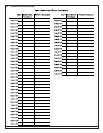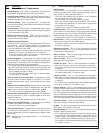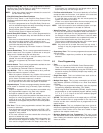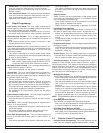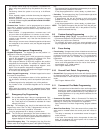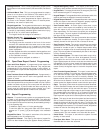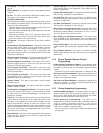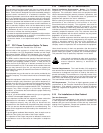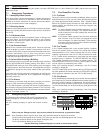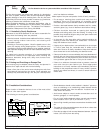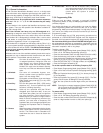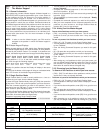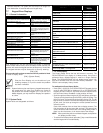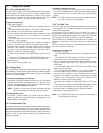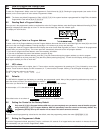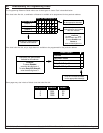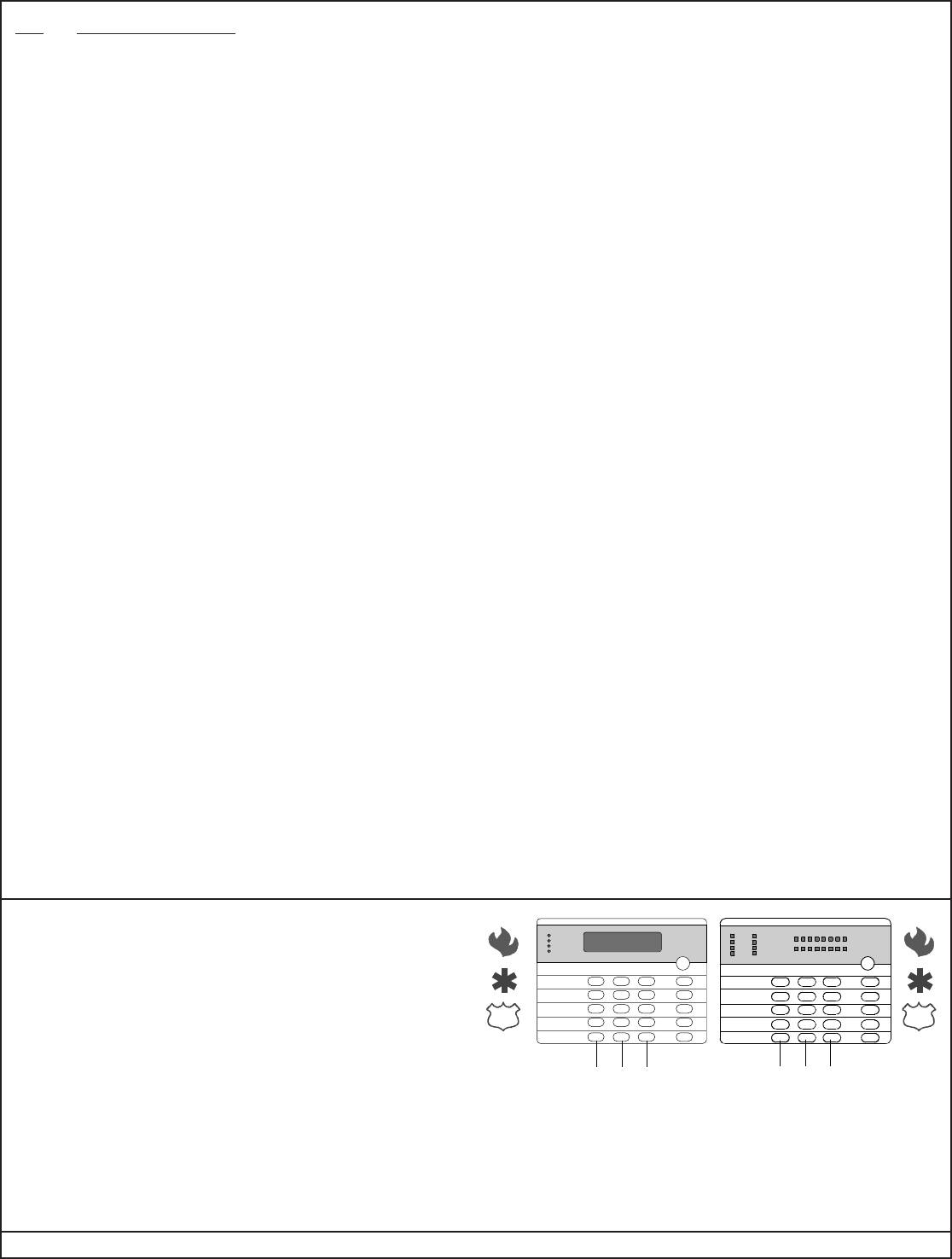
Page 26 P/N: F01U035325-01 Copyright © 2007 Bosch Security Systems, Inc. DS7400Xi (4+) Reference Guide
7.0 Operating Guide
For additional information on operating this system, consult the DS7400Xi (Ver. 4+) User’s Guide (P/N: 43851) and the front cover of this
Reference Guide.
7.1 Emergency Procedures
7.1.1 Identifying Alarm Sounds
Your alarm system may be programmed for a steady alarm sound
or a pulsed alarm sound. It is important to learn the difference
between a fire alarm sound and an intrusion alarm sound before
you are confronted with an actual emergency.
7.1.2 Silencing Alarms
All alarms can be silenced with any PIN that has disarm privileges.
Entering your [PIN]+ [Off] will silence the alarm and turn off (disarm)
the control.
7.1.3 A Cautionary Note
How you respond to an alarm will depend, mostly, on the type and
time of the alarm. You should seek the advice of your installing
company as they install your system, not later (e.g. after an alarm)
to develop a response plan.
7.1.4 Use Common Sense
Above all else, common sense should prevail. If there is any threat
or hint of danger to yourself or others on the premises, such as in
the event of a fire alarm, everyone should be instructed to leave the
premises immediately. Do not enter the premises unless
accompanied by the appropriate Emergency Services’ personnel,
or after they have given the OK to enter.
7.1.5 Caution When Entering a Building
If the bells and sirens are on and/or the red Armed Light is flashing
with the DS7447/DS7447E display reading “Zone Alarm” or the
DS7445/DS7445i having its zone LEDs flashing, then the keypad
is signaling that an alarm has occurred. The keypad will also issue
a pulsed tone during the entry delay instead of the usual steady
tone.
If the alarm has not been previously investigated, do not enter the
building unless accompanied by the appropriate Emergency
Services’ personnel.
7.1.6 Fire Alarms
Fire Alarms are silenced using the same procedure as intrusion
alarms: a [PIN] (with disarm privileges) plus the [Off] key.
The Fire Alarm system is not reset until alarms at smoke detectors
are cleared by using the [System Reset] command. The Fire Alarm
system will not be functional until this procedure has been followed.
See the “Fire Reset” section, 7.2.
7.2 Fire Reset/Fire Trouble
7.2.1 Fire Reset
During a fire alarm, exit the premises immediately. When you have
determined there is no fire, you may silence the bells/sirens before
you initiate the [System Reset] command: [PIN] + [System Reset].
Before the [System Reset] command is used, determine which
smoke detector has alarmed so the monitoring company may
verify its operation.
NOTE: To use the System Reset command sequence, your PIN
must have disarm privileges. The System Reset com-
mand will perform a fire reset, a battery test, and will clear
all system troubles.
NOTE: If the System Reset command has not been performed
after 24 hours of the Fire Alarm, the keypad will sound
and it will display “Fire Alarm Not Reset.” If the sounders
have been silenced and the system has been reset prop-
erly, this warning will not occur.
7.2.2 Fire Trouble
A Fire Trouble message with a zone number signifies a problem
with the fire system, such as a break in the wiring that monitors
smoke detectors. A Fire Trouble message with no zone number
indicates a ground fault if the unit is in the commercial fire mode.
A Fire Trouble will be indicated by a short beep from the keypad
sounders every 10 seconds. The DS7447/DS7447E will display
“Fire Trouble” followed by the zones in a trouble condition. The
DS7445/DS7445i will turn the Fire and Trouble Lights on steady
and will light the corresponding zone LEDs.
Notify your installing company immediately if the Fire Trouble
message is displayed.
The Fire Trouble beep can be silenced with any [PIN] plus the [Off]
key. After problems have been remedied, a [PIN] plus the [Off] key
should again be entered to clear the “Fire Trouble” display.
7.2.3 Dirty Smoke
A Dirty Smoke display, followed by a zone number and accompanied
by a beep every ten seconds indicates that the smoke detector for
that zone requires cleaning or replacement. The smoke detector
will also give a Dirty indication by flashing its LED once per second.
The Dirty Smoke beep can be silenced by any [PIN] plus the [Off]
key.
Notify your installing company immediately if the Dirty Smoke
message is displayed.
When using the Emergency Keys, they must be pressed for two seconds to generate an alarm.
NOTE: If the Emergency Alarm Keys are to be used, they should be labeled to signify their functions.
The A key should be labeled as the Fire key. This is the only key that may be designated as the Fire key.
The B key should be labeled as the Special Emergency key.
The C key should be labeled as the Panic key.
Use the Disarming Command Sequence to cancel or silence these alarms.
7.3 Emergency Keypad Alarms
The Emergency Alarm Keys [A], [B], and [C] may generate Fire,
Special Emergency, and Panic Alarms if programmed by the
installer.
Ask your installing company to explain the function of these
keys.
Armed
St at us
Power
Fire
1 23
456
789
0
*
#
On
No
Entry
System
Reset
Bypass
Onl y
Per i me t er
Off
ABC
ABC
1 23
456
789
0
*
#
On
No
En tr y
System
Reset
Bypass
Only
Perimeter
Off
TEST WEEKLY
12345678
91011121314
1516
Armed
St at us
Power
Fire
Perimeter
Supervisory
Bell Silenced
Tro uble



